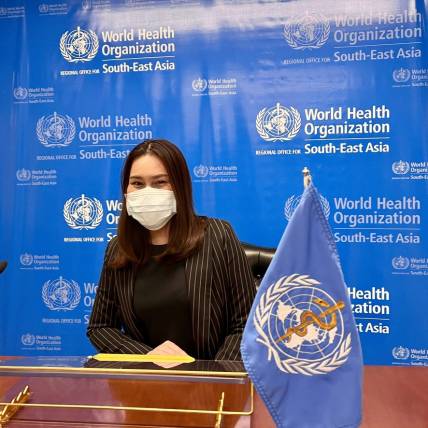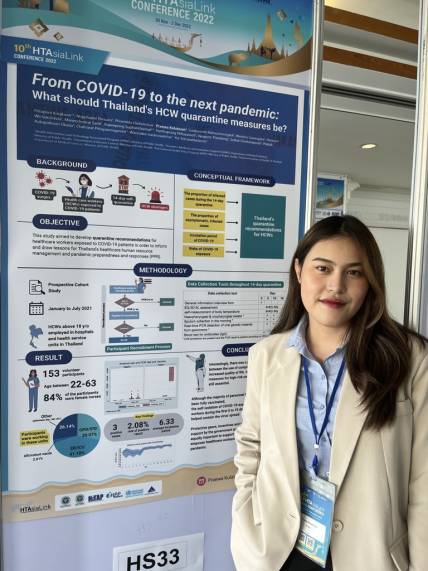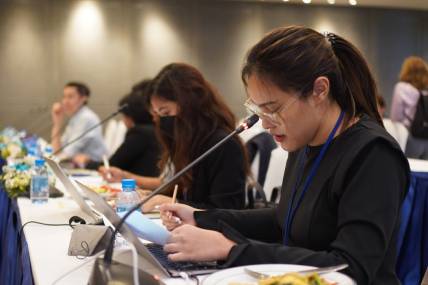Student Spotlight: Praewa (Wawa) Kulatnam (MPA-HPAM 2025)

Praewa (Wawa) Kulatnam (MPA-HPAM 2025)
What inspired you to pursue a healthcare management and policy career, and how has your journey evolved since moving to New York?
My inspiration comes directly from my grandmother's experience. She suffered from heart disease in rural Thailand, and the lack of equitable healthcare access was devastating, not just for her, but for our entire community. Seeing generations of families struggle with the financial burden and socioeconomic barriers to healthcare ignited a fire in me. I knew I wanted to make a difference.
My journey started as a policy research assistant at a nonprofit health policy evaluation organization within Thailand's Ministry of Public Health. There, I contributed to impact evaluations of drugs and medical interventions for public health insurance. Working during the COVID-19 pandemic was a pivotal experience. I was involved in recommending evidence-based policy interventions for Thailand and neighboring countries, and I collaborated on knowledge sharing with Asian and African countries to develop universal healthcare.
Moving to New York and starting at NYU Wagner has broadened my perspective immensely. It's exposed me to the complexities of healthcare systems in a very unique, real-life laboratory as a city where policymakers and business leaders globally are working and interacting, pushing me to think more strategically and comprehensively about solutions.

How has your experience at NYU Wagner influenced your approach to health policy and management so far?
NYU Wagner has been transformative. It's given me a strong foundation in both the theoretical and practical aspects of health policy and management. A key strength of Wagner is its strong connections with real people in the field, which has been both an expectation and a reality for me. This allows students to gain real-time policy theory applications. What's happening at the city, state, federal, or international stage is actively discussed in classes, student clubs, or school events, and students are encouraged to contribute meaningfully. This develops our professional experiences and fosters critical thinking and collaboration with peers who are also going to or are already, influencing such policies.
The diverse faculty and student body have expanded my understanding of healthcare systems and perspectives. The emphasis on data-driven decision-making and policy analysis has sharpened my critical thinking skills, which students can enhance through qualitative and quantitative coursework, internships, capstones, and healthcare competitions (if you're in my field). I've also gained valuable insights into the intersection of policy, management, and social justice, which is crucial for addressing health inequities.
What are some key lessons you’ve learned from creating content and sharing first-gen student/professional stories on your YouTube channel?
There are so many unspoken rules and lessons I've never been taught because I am a first-generation and do not want to pass this pity along to the following generations. I started from a small, casual peer-to-peer learning, and then COVID-19 triggered me to go bigger into social media, where I also found out there are more and more people out there who see the benefits of telling this story and helping them get unstuck.
Creating content and sharing first-gen student/professional stories has been incredibly rewarding. My biggest lesson is the power of vulnerability and authentic storytelling. People connect with genuine experiences and struggles. It's shown me that many first-generation students and professionals face similar challenges, and sharing these stories creates a sense of community and support.
I've also learned the importance of representation. Seeing people who look like you and share similar backgrounds succeed can be incredibly motivating. It's about showing that these paths are possible and providing practical advice and resources to help others navigate them. And of course, learning how to edit videos and engage with an audience has been a whole new skill set!

As someone passionate about mentoring and opening doors for others, what advice would you give to international students interested in pursuing a similar path?
My biggest piece of advice is to build your network and don't be afraid to reach out to people. Connect with professors, alumni, and professionals in your field. Wagner alumni are the friendliest and most genuine people I've interacted with, and they are real experts, especially in the healthcare industry. Attend networking events and conferences, where Wagner also has funding to support your professional development. Utilize resources like LinkedIn and industry-specific associations to connect with people in your target industry. Embrace your unique perspective as an international student—it's a strength, not a weakness. Although everyone's journey could be different and not full of roses, you'll grow so much from this experience of living, studying, and working in this great city. So, find your 'people' and remember to stay true to your passion and why you started this journey in the first place, it's what will keep you going during the tough times.
What are your long-term goals in healthcare policy, and how do you see yourself making an impact on global health?
I do not want to limit myself to a certain "job description," but my long-term goal is to contribute to building more equitable and accessible healthcare systems, domestically and internationally. I want to work on developing and implementing evidence-based policies that address health inequities and improve health outcomes for underserved populations. I'm particularly interested in leveraging technology and innovation to expand access to healthcare in resource-limited settings. I envision myself working in a role where I can bridge the gap between policy, research, and practice, collaborating with governments, NGOs, and international organizations. Ultimately, I want to play a role in creating a world where everyone has the opportunity to live a healthy and fulfilling life, regardless of their background or where they live. I want to contribute to the global health conversation by ensuring that knowledge and best practices are shared across borders, particularly with developing countries striving to build robust universal healthcare systems.